Tandem author and expert: how to make it effective?
In August, RUVDS and Habr's content studio conducted a seminar on “How to motivate an author, even if he is a programmer.” Following the results, we decided to publish some interesting, in our opinion, reports in our blog.
Experts have the knowledge - but often they don’t want or can’t turn it into text. Journalists are able to write, but they need an invoice. The best option - work in conjunction. But how to make the tandem effective and get a smart article?
The head of the content studio Habra Anton Polyakov told about the pitfalls of the teamwork of the expert and freelance author and how to set everything up. Below is a transcript of his report.
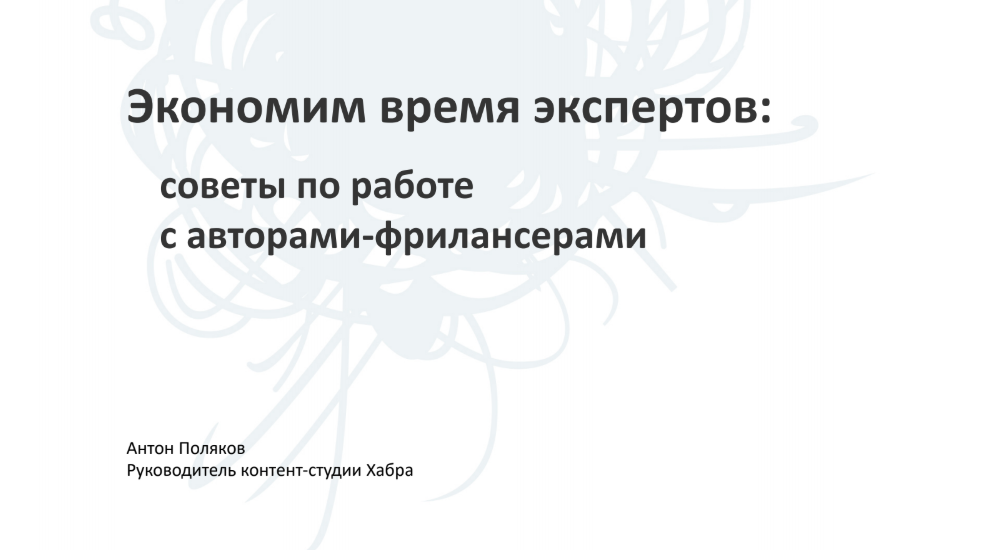
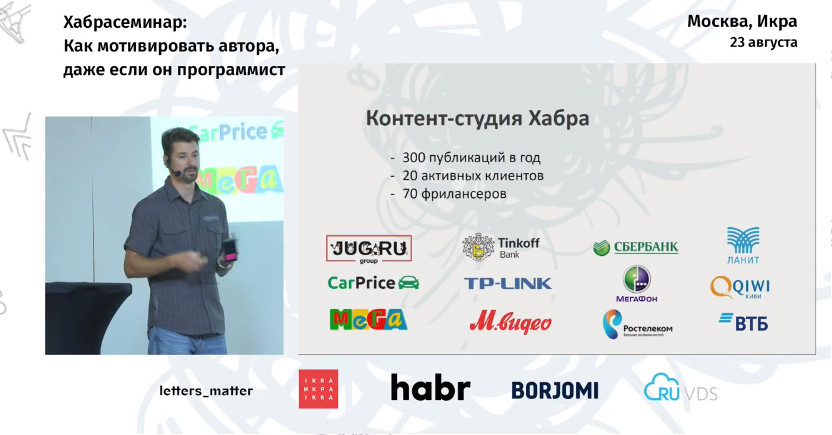
First a few words about us. We are the Habra content studio, we help companies prepare articles for blogs, develop a publishing strategy, create a content plan. We advise, for the most part free of charge, we organize trainings for authors and devrel. And during this time have accumulated a lot of experience in all aspects of the preparation of publications.
')
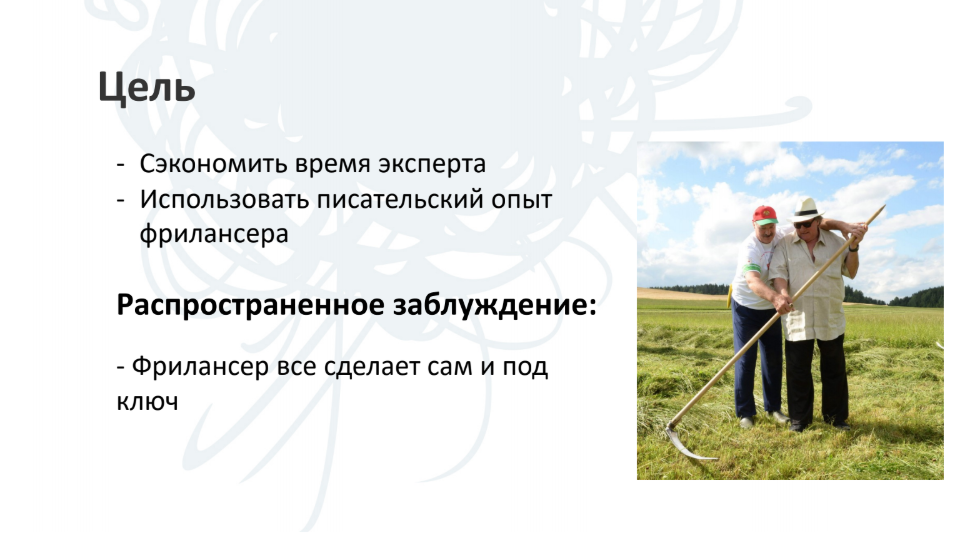
An expert is a busy person. He is working on projects, and he has an established texture. But in order to wrap this texture in an article, he may not have enough time or writing skills. The obvious way out is to help an expert journalist who will turn his knowledge into a publication.
And here comes the first misconception: “the freelancer will do everything on a turnkey basis” - it is enough just to reduce the author and the expert, and in the end you get chic stuff. No, it will not work. To make the article qualitative and interesting, the customer must also participate in it.
The key point is to choose the right person to work with the expert. Our practice shows that the same expert fits best for the role of the author: for example, a developer or another person with the appropriate set of knowledge, or someone who writes well. Why? Because a person who is in the subject can ask the right questions, puts the right accents, does not miss the details and always keeps in mind the purpose of the article. If we take another specialist who also has good writing skills, there is a chance that he will miss something, focus not on that, the material will not be so deep, not so expert. Quality will suffer here.
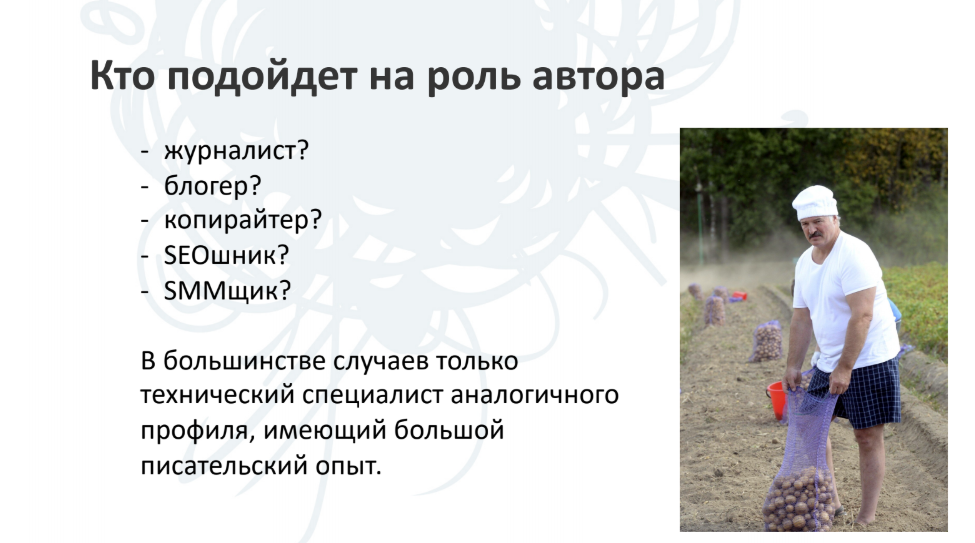
Yes, it is not always possible to find a specialist who deeply owns the issue. The alternative is journalists who know how to talk to the speaker. By the way, an interview with the speaker is a separate story: to talk, to see that the main thing that is not, owning terminology is also a great art.
An important part of the preparation of the material is the brief. On the one hand, the thing is obvious, but I want to draw attention to a few points that must be present.
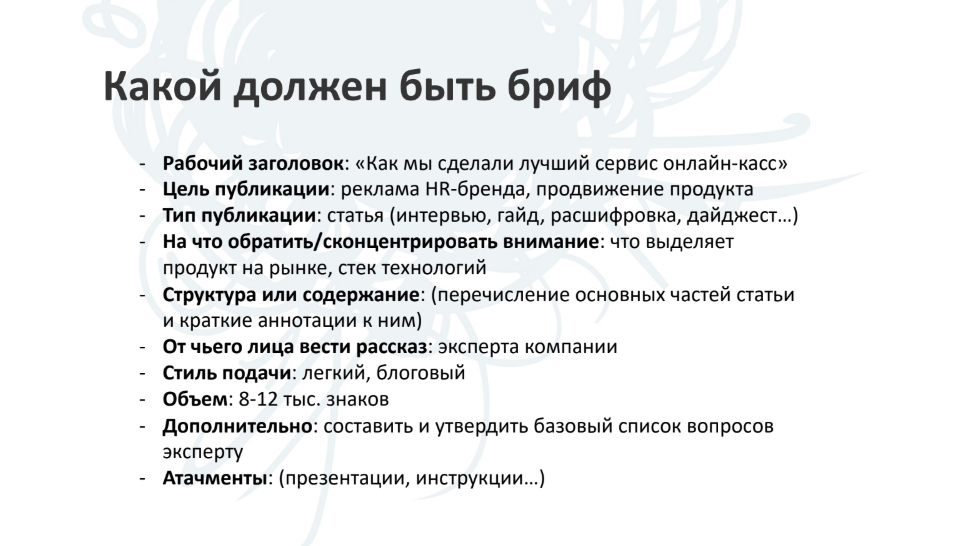
The first moment is the working title. Sometimes people set a task like this:
- Let's write how we develop online cash registers.
- Let's write, and what will we write?
“Well, how we designed them.” We have a stack that we did ...
Here the subject is not clear, nor how to submit it. With this approach, the material will be appropriate, with blurred focus. If we formulate the topic more clearly: as we have done the best service (the word “best” is key here), the structure is immediately built.
First, we explain to the reader why he is the best, why we did it this way, why we took these tools. From here it turns out cool stuff. Therefore, we formulate the topic as accurately as possible and then start from it.
Further in the head we hold the tasks that face the publication. We see on Habré a lot of articles, just interesting, cool articles that do not fulfill the tasks of the company. They entertain the public, maybe they attract someone’s attention, but they don’t do their job. So, of course, keep a goal in mind when writing materials. What will it be? Product Promotion? Then let's make the insertions in the article: carefully, imperceptibly and at the same time efficiently.
The journalist must be provided with data, and this must be done before he starts composing the questions to the expert. The more information a journalist has, the more interesting he will be able to build a dialogue, and the more interesting the material will be.

When accepting work there are two key points: brief and design. When an author or a journalist is holding a brief, it is convenient for you to point out inconsistencies, and journalism to refine them. There will be no debate, plus the time and the number of iterations will be reduced. Naturally, discuss with both, that most likely need to be improved. Otherwise, as is often the case without an agreement, writers who are painfully related to editing immediately turn sour and disappear for 2-3 days. And you wait until they come to their senses and finish the work.

It happens that a person sends the material, you read and understand - absolutely not that. If the case is not particularly neglected, tell the author what you were waiting for. He will edit. If the material is not at all in cash, it is better to change the author. It is necessary to collect all the materials, technical specifications, brief, expert answers and transfer to another person. This is a common story, there is nothing scary here. For example, we work with many journalists, and it so happens that a person has passed five excellent materials - and the sixth topic does not go. Either not him, or he hoped that he would understand it quickly. It is clear: we do not give him such a topic anymore, we are calculating at the minimum rate so as not to offend and preserve the relationship.
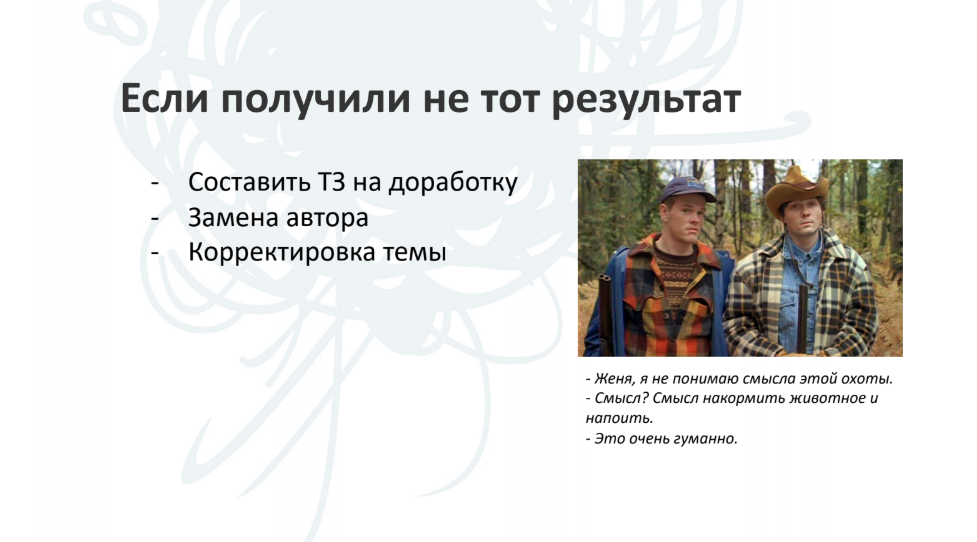
There is also a cool trick - adjusting the topic. Example: a technology review was ordered, and suddenly an expert interview was sent instead of a review. Then we try to change the format of the article for an interview about technology, in which the expert expresses his opinions on this issue. Then easy editing - and the material can go quite well.
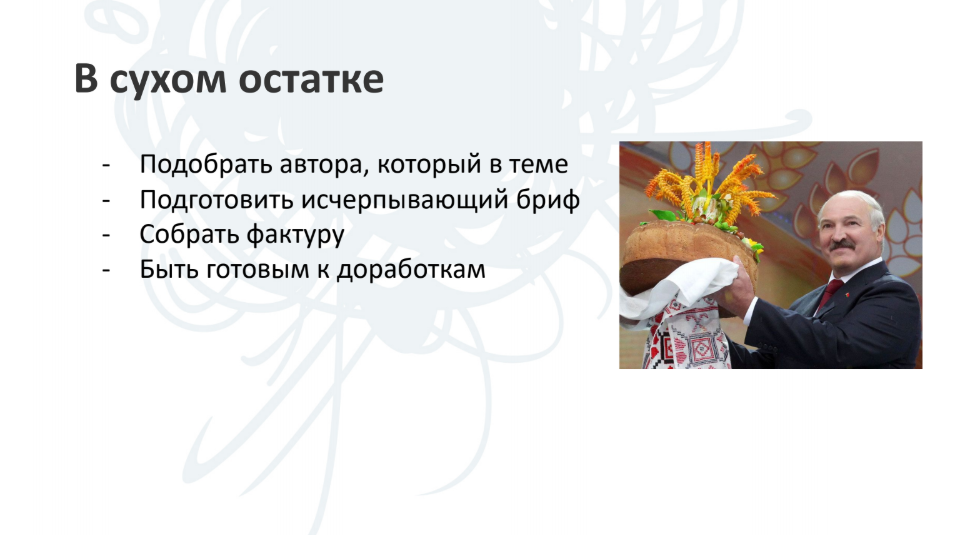
Once again the main points:
This is a recipe for success. We still have clients, especially large companies, often asked: “Why are you bothering so much? Today we talked with an expert, two days later we passed. What is there to do? ”All this is true exactly until such time as the revisions and coordination have begun, which take a lot of time. And in this regard, a high-quality brief helps save time for yourself, an expert and a journalist.
Questions from the audience:

How much time, resources and money spent on the preparation of the post?
Post fast discord. If we call the average temperature in the hospital, then we always say that we are preparing posts during the month. If the work is going perfectly: the speaker is in touch, the journalist or the expert is free, you can manage in 3–4 days, this is already editing. Usually we are waiting for the speaker, then we are waiting for the author, because he may have several materials in his work. Month - this is work in a quiet mode, sometimes, we do it in a week. And sometimes, on the contrary, the speaker does not respond or on a business trip, he will return in a month, and in a month he already forgets about us. For money, too, in different ways: since the proofreader, the author, and the editor are involved in the preparation of the material, the approximate plug for one article is 8-15 thousand rubles, not including organizational, editorial work.

Your brief is designed by trial and error or taken from somewhere with modifications?
This is our brief, which we use in our work.
We want to be interesting to talk about their products in the blog, but the developers absolutely can not write. I, as a PR person, help them. Therefore, it is now important for us to get a review to refine the texts to the ideal. Can you show our articles? And under what conditions?
Yes, you can send materials, we will give a review. We have a separate service, but we will look at a few materials for free. In general, we conduct trainings for authors within the company; over the past six months, we have held about 5–6 meetings.

Hypothetical situation: we have an excellent expert, an excellent journalist who understands the topic. For the month they wrote the material, we paid 30,000 rubles, but the article did not stop, it hangs out with a rating of +2,500 views. How to live with it?
Send the text, we'll see. There are many options: they did not get into the right audience, for example, they didn’t deepen or turn the subject in the wrong direction, etc. Writing is like art. Those people who blog as artists draw a new picture every time. No one knows how she will go, whether the public will like it. Yes, there are general principles for writing a good text, but there are no guarantees. Sometimes the old woman is proruha. We analyze the blogs of companies and often see the following picture: under the articles, first the marks are +50, +30, +30, then –5. Missed. In order to miss less, there must be experience, and it should be worked out.

Experts have the knowledge - but often they don’t want or can’t turn it into text. Journalists are able to write, but they need an invoice. The best option - work in conjunction. But how to make the tandem effective and get a smart article?
The head of the content studio Habra Anton Polyakov told about the pitfalls of the teamwork of the expert and freelance author and how to set everything up. Below is a transcript of his report.


First a few words about us. We are the Habra content studio, we help companies prepare articles for blogs, develop a publishing strategy, create a content plan. We advise, for the most part free of charge, we organize trainings for authors and devrel. And during this time have accumulated a lot of experience in all aspects of the preparation of publications.
')

Who is an expert
An expert is a busy person. He is working on projects, and he has an established texture. But in order to wrap this texture in an article, he may not have enough time or writing skills. The obvious way out is to help an expert journalist who will turn his knowledge into a publication.
And here comes the first misconception: “the freelancer will do everything on a turnkey basis” - it is enough just to reduce the author and the expert, and in the end you get chic stuff. No, it will not work. To make the article qualitative and interesting, the customer must also participate in it.
Who will be the author
The key point is to choose the right person to work with the expert. Our practice shows that the same expert fits best for the role of the author: for example, a developer or another person with the appropriate set of knowledge, or someone who writes well. Why? Because a person who is in the subject can ask the right questions, puts the right accents, does not miss the details and always keeps in mind the purpose of the article. If we take another specialist who also has good writing skills, there is a chance that he will miss something, focus not on that, the material will not be so deep, not so expert. Quality will suffer here.

Yes, it is not always possible to find a specialist who deeply owns the issue. The alternative is journalists who know how to talk to the speaker. By the way, an interview with the speaker is a separate story: to talk, to see that the main thing that is not, owning terminology is also a great art.
Brief
An important part of the preparation of the material is the brief. On the one hand, the thing is obvious, but I want to draw attention to a few points that must be present.

The first moment is the working title. Sometimes people set a task like this:
- Let's write how we develop online cash registers.
- Let's write, and what will we write?
“Well, how we designed them.” We have a stack that we did ...
Here the subject is not clear, nor how to submit it. With this approach, the material will be appropriate, with blurred focus. If we formulate the topic more clearly: as we have done the best service (the word “best” is key here), the structure is immediately built.
First, we explain to the reader why he is the best, why we did it this way, why we took these tools. From here it turns out cool stuff. Therefore, we formulate the topic as accurately as possible and then start from it.
Further in the head we hold the tasks that face the publication. We see on Habré a lot of articles, just interesting, cool articles that do not fulfill the tasks of the company. They entertain the public, maybe they attract someone’s attention, but they don’t do their job. So, of course, keep a goal in mind when writing materials. What will it be? Product Promotion? Then let's make the insertions in the article: carefully, imperceptibly and at the same time efficiently.
Collection of information
The journalist must be provided with data, and this must be done before he starts composing the questions to the expert. The more information a journalist has, the more interesting he will be able to build a dialogue, and the more interesting the material will be.

Work acceptance
When accepting work there are two key points: brief and design. When an author or a journalist is holding a brief, it is convenient for you to point out inconsistencies, and journalism to refine them. There will be no debate, plus the time and the number of iterations will be reduced. Naturally, discuss with both, that most likely need to be improved. Otherwise, as is often the case without an agreement, writers who are painfully related to editing immediately turn sour and disappear for 2-3 days. And you wait until they come to their senses and finish the work.

When everything is wrong
It happens that a person sends the material, you read and understand - absolutely not that. If the case is not particularly neglected, tell the author what you were waiting for. He will edit. If the material is not at all in cash, it is better to change the author. It is necessary to collect all the materials, technical specifications, brief, expert answers and transfer to another person. This is a common story, there is nothing scary here. For example, we work with many journalists, and it so happens that a person has passed five excellent materials - and the sixth topic does not go. Either not him, or he hoped that he would understand it quickly. It is clear: we do not give him such a topic anymore, we are calculating at the minimum rate so as not to offend and preserve the relationship.

There is also a cool trick - adjusting the topic. Example: a technology review was ordered, and suddenly an expert interview was sent instead of a review. Then we try to change the format of the article for an interview about technology, in which the expert expresses his opinions on this issue. Then easy editing - and the material can go quite well.

Results
Once again the main points:
- author with the necessary background;
- quality brief;
- invoice collection;
- readiness for rework.
This is a recipe for success. We still have clients, especially large companies, often asked: “Why are you bothering so much? Today we talked with an expert, two days later we passed. What is there to do? ”All this is true exactly until such time as the revisions and coordination have begun, which take a lot of time. And in this regard, a high-quality brief helps save time for yourself, an expert and a journalist.
Questions from the audience:

How much time, resources and money spent on the preparation of the post?
Post fast discord. If we call the average temperature in the hospital, then we always say that we are preparing posts during the month. If the work is going perfectly: the speaker is in touch, the journalist or the expert is free, you can manage in 3–4 days, this is already editing. Usually we are waiting for the speaker, then we are waiting for the author, because he may have several materials in his work. Month - this is work in a quiet mode, sometimes, we do it in a week. And sometimes, on the contrary, the speaker does not respond or on a business trip, he will return in a month, and in a month he already forgets about us. For money, too, in different ways: since the proofreader, the author, and the editor are involved in the preparation of the material, the approximate plug for one article is 8-15 thousand rubles, not including organizational, editorial work.

Your brief is designed by trial and error or taken from somewhere with modifications?
This is our brief, which we use in our work.
We want to be interesting to talk about their products in the blog, but the developers absolutely can not write. I, as a PR person, help them. Therefore, it is now important for us to get a review to refine the texts to the ideal. Can you show our articles? And under what conditions?
Yes, you can send materials, we will give a review. We have a separate service, but we will look at a few materials for free. In general, we conduct trainings for authors within the company; over the past six months, we have held about 5–6 meetings.

Hypothetical situation: we have an excellent expert, an excellent journalist who understands the topic. For the month they wrote the material, we paid 30,000 rubles, but the article did not stop, it hangs out with a rating of +2,500 views. How to live with it?
Send the text, we'll see. There are many options: they did not get into the right audience, for example, they didn’t deepen or turn the subject in the wrong direction, etc. Writing is like art. Those people who blog as artists draw a new picture every time. No one knows how she will go, whether the public will like it. Yes, there are general principles for writing a good text, but there are no guarantees. Sometimes the old woman is proruha. We analyze the blogs of companies and often see the following picture: under the articles, first the marks are +50, +30, +30, then –5. Missed. In order to miss less, there must be experience, and it should be worked out.

Source: https://habr.com/ru/post/424339/
All Articles